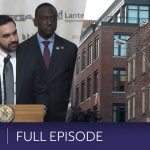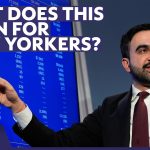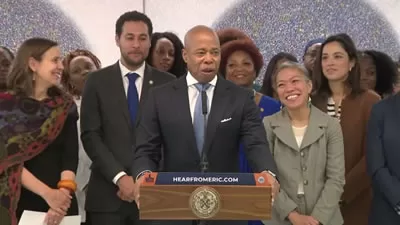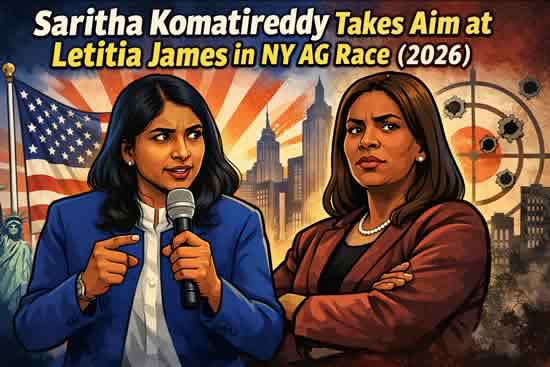First Deputy Mayor Sheena Wright: All right, all right! What are we here for?
Audience: Just pay!
First Deputy Mayor Wright: When do we want it?
Audience: Now!
First Deputy Mayor Wright: Got it! Done! Good afternoon. I am First Deputy Mayor Sheena Wright, and I would like to welcome you today to this wonderful, wonderful day. The sun is shining down on us as we have a big announcement. The human services world is significant. The city does not run without our human services partners. Yes.
The nonprofit workers that every single day all day work to make sure that our city gets what it needs. From day one of this administration, actually before day one, this mayor has said to our team, make sure we center the people of the City of New York. Make sure we center the workers, the people who have often been forgotten, and that certainly includes our nonprofit sector.
And so I’m so excited and grateful to introduce the 110th mayor of the City of New York who’s going to make a big announcement.
Mayor Eric Adams: You know, such a significant moment for not only for me, but for the speaker who’s here with us to make this amazing announcement. When you think about it, standing behind us, they are our parents. Being a mom, being a food service worker at Amistad day care center, Speaker Adams’ mom being a Correction officer, and when we came into office, we had real commitments that we had to live up to.
And I know that you guys enjoy looking at the three or four things we disagree with, but look at the 50 to 60 to 100 things that we have accomplished. And we’re not going to allow anyone to tarnish how these two kids from South Jamaica, Queens, navigated this city out of some of the most difficult times. Two years and two months. You know, two years and two months.
And at the heart of it was how do we correct the course for our essential non‑profits? We inherited a system, they were not paid on time. They were paid not a wage that was suitable for the work that they were doing, and nothing personified that more than during the moments of Covid when everyone was being in isolation, they were out managing the city in the real way. They were dealing with the inability to navigate government.
So we came in, and First Deputy Mayor Sheena Wright, who ran a nonprofit, when we sat down after winning the campaign, before taking office, we said we had to put in place a real plan to deal with the historical problems that our nonprofit sector was facing.
So, what did we do? First thing we had to do was create an office of nonprofit, because you should not need a nonprofit to figure out how to navigate government. we need someone specifically you can go to, that you can communicate with and navigate government.
Second thing we heard, we heard all the time from nonprofits. When I was doing my conversation with the nonprofits over and over again, government was playing a game with them. They had them do the service and then they wanted to pay them pennies on the dollars and not how much it really cost to do the service after you made the agreement.
And the backlog was unbelievable. We had a $6 billion backlog, January 1st, 2022, when we took office. Deputy Mayor Wright sat down and we were here late at night, and she said, we have to to close that gap. Within 12 weeks, we closed a $4 billion gap that non‑profits were owed in four weeks, in six weeks. Six weeks, 12 weeks, 12 weeks. Let me get the exact number, because they’ll write about me and say the wrong number.
12 weeks. But 12 weeks, we fixed the problem that was in place for 30, 40 years, in 12 weeks. And then we did something else that was so important and why I’m proud to be here today with the speaker to announce it.
We had to deal with the economic issues that they were facing of not being paid a salary. When you are a service provider seeing people who are broken in so many ways, you can’t also be broken. You can’t worry about providing a service and then going home and figuring out how do you provide a service for your family and what to do in the right way in the process.
And as I walked in, I saw a longtime friend and advocate, Dr. Charles, who has been, we were police officers together. And she has called me repeatedly, folks. Let me tell you. She has called me, texted me, tweeted me, saying, Eric, we got to get this, we got to get this resolved, even if we need to sleep out in front of City Hall. All that needed to be done.
You know? All that needed to be done. But here’s the beauty of it. She could reach me. She could reach me. Everyday people can reach their mayor and share on a real way, not insulated, not layers and layers and layers to get to me. She was able to reach directly and said, Eric, we need to fix this.
And so today we are delivering on the vision of putting money back in the pockets of working class New Yorkers. This is how you get things done, and New York City’s human service workers led us through the darkest days in the pandemic.
But also, I can tell you about the human service workers that helped my family continue to be able to thrive. I’m here as the mayor of the City of New York because there were human service workers that were there for my family and my five siblings when we needed it the most. So, this is not professional, this is personal.
We want to connect and continue to connect New Yorkers with service, but we must make sure those who are providing our service get the care that they want. These men and women are the hands and hearts of New York City, 24/7 work that benefits all New Yorkers. It can be tiring, it can be thankless, it can be exhausting.
And you live through the vicarious trauma of people who are going through trauma every day. And too long their wages have not kept up with the rising cost of living; and to be clear, this has been a priority since, not even since day one, we were talking about it before getting office, talking about it before winning the primary.
We were mapping this out before winning the primary. And I sat down with OMB and the team on how we can work with all the advocates standing here today. These folks who are behind us have been advocating for this for so long.
So, today, I’m proud to announce that our administration and the City Council is getting our human service workers the pay they deserve. If you dedicate your life to serving New Yorkers, we should dedicate our lives to making sure they get the pay they deserve. This is why we are investing $741 million to deliver fair wages for the 80,000 nonprofit employees working within this city.
This will amount to a 9.2 percent pay increase over the next three years, and it is going to lift up a workforce that is majority — majority — look like our moms.
Majority looks like our moms. Living up to our commitment that we gave. And they represent the parents of this city, and they’re now going to benefit from the prosperity of this city.
Adding past wage enhancements we made for the sector, we’ve now invested $1.4 billion to improve pay for human service workers.
This is how we build equity and give workers the support they deserve. This is how we help our nonprofit partners attract and retain top talent going forward. This is how we continue our administration’s track of supporting working class New Yorkers.
In two years we have negotiated historic contracts with unions representing 95 percent of the city workforce and 100 percent of the city’s uniformed workforce. And then when they vote on the contract, it’s 94 to 98 percent ratification rate. Everyday workers stop me all the time and say, at last a blue collar mayor has heard our blue collar concerns and we’re seeing the difference in it.
We’ve hit this milestone faster than any administration in modern history. And now we are also investing in the nonprofit employees doing the work for our city. By offering fair pay, we’re creating a fairer and more equitable city, ensuring that New York City is not the greatest city in the world to live but also one of the greatest places to work, especially for those who sacrifice so much for us.
So, I really want to thank all of our partners that are here, all of them for delivering so many years. And a special thanks goes out to a City Council speaker and leader that just gets it, and we got it, and we did it. I want to turn it over to the speaker of the City Council, Adrienne Adams.
City Council Speaker Adrienne Adams: So, what are you getting?
Audience: Just pay!
Speaker Adams: What are you getting?
Audience: Just pay!
Speaker Adams: When are you getting it?
Audience: Now!
Speaker Adams: When are you getting it?
Audience: Now!
Speaker Adams: When are you getting it?
Audience: Now!
Speaker Adams: That’s what I’m talking about.
Thank you so much, Mayor Adams… No relation. They always write that. They always write that, right? For that warm introduction. thank you so much. You know, Jennifer, it was just a few months ago we were in the front over there rallying, right? We were rallying, raising our voices for exactly what we’ve accomplished. Finally, finally we made it.
I want to acknowledge Damyn Kelly and Michelle Jackson from the Human Services Council. Autrice Wildman from Encore Community Services. And so many of our nonprofit service providers.
I’m so glad to be here with our government nonprofit and labor partners to celebrate this critical investment in support of our human service workers who do so much for the people of our great city. From providing childcare and fighting against homelessness, to addressing food insecurity and providing mental health services and everything in between, our nonprofits have been a vital partner to city government and delivering services. This foundational role that our nonprofit sector plays in providing New Yorkers with the services they need to thrive makes them indispensable to the core functioning of our city. And as I said yesterday, these are our first responders, ladies and gentlemen.
Yet despite their role in supporting New Yorkers and taking on our city’s greatest challenges, human service workers are among the lowest paid in our city, and that’s totally unacceptable. They deserve to be paid what they are worth and for the worst work that they do. In last year’s budget negotiations, the Council prioritized and secured the baselining of $100 million in FY24 and $150 million in FY25 to boost the wages of our nonprofit workers. These investments laid the groundwork for the important step the city is making today toward fair wages for the sector.
This COLA is long overdue, and it reflects the value of our human service workers who are predominantly, as the mayor said, women and people of color, the people that look like our mothers. When we pay these workers what they deserve, we show them that our actions speak louder than words, and we acknowledge the true importance of their work.
As we look ahead, we know that investment in this workforce cannot end here. Much more needs to be done. Alongside fair pay, our nonprofits must be paid on time. Because too often, late payments to our vital nonprofit organizations endanger their operation and threaten their jobs across the entire sector. When we in government talk about sustaining our nonprofit sector for the future, this must be our north star.
And as always, the Council will be a strong advocate in getting this workforce and this sector what it deserves; and in turn, what all New Yorkers deserve. Thank you and congratulations.
What did you get?
Audience: Just pay!
Speaker Adams: What did you get?
Audience: Just pay!
Speaker Adams: When did y’all get it?
Audience: Now!
Speaker Adams: When did you get it?
Audience: Now!
Speaker Adams: That’s what I’m talking about.
First Deputy Mayor Wright: Thank you so much, Speaker Adams. And yes, they got it right now. I want to underscore a few things so they do not get lost. This is a workforce of 80,000 people. 75 percent of the workforce are people of color, and almost 70 percent are women, and a substantial number of women of color.
I also want you not to have missed, since day one when we got into office we included wage increases for this sector in year one and in year two and in today, total investment in just this short period of time, $1.4 billion.
And I want to just uplift and underscore like how things get done, we are a Get Stuff Done Administration, how things get done. So, you’ll see not only in the crowd are the workers and the organizations, but agency leaders. This workforce supports the vital work of our major agencies in this city.
So, you’ll see here representatives from the Administration for Children Services, the Department of Health and Mental Hygiene, New York City Public Schools, DYCD. Are you in the house? Yeah! HPD, Mayor’s Office of Criminal Justice, our Department of Social Services, our Department for Aging, our Department of Probation.
All of these agencies cannot get the work done without their vital partners. And this increase, all of these wages, this investment is made possible by the sustained push of the mayor and the leadership of this administration.
And I have to really give a shout out to my sisters in government, Deputy Mayor Anne Williams‑Isom, Deputy Mayor Ana Almanzar, our chief of staff, Camille Joseph Varlack, and I mean, you know who’s a real force. She couldn’t be here today, our chief advisor, Ingrid Lewis‑Martin. Ingrid was not having it. She was like, this has to happen, and so we are grateful to her.
And I also have to call out the money people, and without the money people it just doesn’t get done. So, Jacques Jiha who couldn’t be here today but Ken Godiner is here, Ken. David Greenberg who is like our superhero, is David here? David is not here, but thank you so much for the incredible work that you’ve done. And I also need to lift up Henry Garrido, where’s Henry? There he is. Henry has been an indispensable partner as we think through these very complex issues, and we’re grateful for your leadership and your partnership.
At this moment. I want to introduce our Human Service Council leaders, and I believe Michelle Jackson was shouted out, but come on Michelle. Michelle.
Talk about late night calls, weekend calls, doing the work, grinding it out. Thank you. Thank you. Thank you for your leadership.
And Damyn Kelly, who is going to, yes, who is going to come address us at this moment. C’mon, Damyn.
Damyn Kelly, Board Chair, Human Services Council: So, I begin by thanking Mayor Eric Adams, Council Speaker Adrienne Adams, First Deputy Mayor Sheena Wright, Chief Advisor Ingrid Lewis‑Martin, and Deputy Mayors Ana Almanzar and Anne Williams‑Isom. Thank you also to the City Council and particularly Councilmember Althea Stevens for championing this cause.
This COLA is essential for a workforce that has long been under‑recognized. Mayor Adams often speaks about the importance of the human services sector in tackling some of our most pressing issues, and I just want to reiterate what he said.
He thought about this way before he was elected. I don’t know, Mr. Mayor, if you remember, but you met with a bunch of CEOs, and one of the first things you talked about was how you wanted to bring equity to the pay. So, we thank you, and we remember.
As mentioned before, our sector has shown up time and time again for this city, from disasters like Hurricane Sandy to the everyday challenges individuals and families face. Never was the importance of the human service sector more clearer than during the Covid pandemic when workers across the city risked their lives to ensure New Yorkers got the care and help they needed.
Human service workers are more than likely women and people of color, as the mayor said. The individuals who hold these jobs live in and help to stabilize the communities of New York City, and we are grateful that the mayor is investing in them.
I also must thank the membership of HSC, the leaders of its various committees, its board members, the advocate organizations and many individuals who are too many to be named here, thank them for their help and their advocacy.
I also want to especially recognize the executive committee of the Human Services Council: Wayne Ho of the Chinese American Planning Council, Eileen Torres of BronxWorks, Janelle Farris of Brooklyn [Works], and the emcee who definitely moves the crowd, Maria Lizardo.
Most importantly, I must recognize and thank the thousands of workers who have been critical in making phone calls, testifying at hearings, and 6,000 of whom showed up right outside to demand just pay. Thank you, Mayor Adams, for hearing their call.
Finally, I must also recognize Michelle Jackson, the executive director of HSC, who has been tenacious in calling on our government partners to pay equitable wages. And I am proud to stand here today with her to celebrate this moment of great progress. Thank you, Michelle.
Thank you, Michelle; and thank you again, Mayor Adams, his team, Speaker Adams and the City Council. We look forward to our continued partnership and to ensuring human service workers and the people they serve can live and thrive in this city as they get a bump up in their wages. Thank you, mayor.
First Deputy Mayor Wright: Yes. I’m going to bring her with me wherever I go. Right, and that’s a perfect segue as we introduce our last speaker, who is one of the heroes, the sheroes that we’re here to really invest in and make sure it gets what they need.
I do want to say also a thank you. We’ve bigged up Michelle absolutely for her leadership, but other people who have been voices in this fight, Grace Bonilla, the CEO of the United Way of New York City, thank you for your guidance and your leadership. And Jennifer Jones Austin who’s always been a voice for truth.
So, last up, and this is the most important speaker here today, is Autrice Wildman. She’s a social case worker at Encore Community Services. She has dedicated her life to service and she has done it in difficult and challenging times and is now finally getting the pay that she deserves. So, Autrice, will you come up?
Autrice Wildman: Good afternoon. Thank you Mayor Adams and your team, and First Deputy Mayor Wright, and Speaker Adams, and City Council. My name is Autrice Wildman, and I have worked in social services for over 17 years in positions ranging from family foster care worker, transportation, Meals on Wheels and now case assistance with Encore Community Services.
I love my job, and having the ability to positively affect the lives of older adults advocating for clients and seeing the relief on their faces when the issues have been resolved.
Back in 2020, at the start of the pandemic, when businesses shut down and New York was in turmoil, this city called on us, the essential workers, and we showed up and made sure all in need continued to receive services. Meals on Wheels deliverers did not only deliver a hot meal, but a smile to isolated older adults. They also became therapists, garbage men and lottery ticket agents.
We see you. All the workers keeping children safe and away from the criminal justice system, crime victim advocates, kitchen staff, childcare workers, residential care workers, we heard you. Today is a victory, and we thank this administration for acknowledging the pay disparity that has been inflicted upon social services workers for over the past 10 years.
Living in this city where a gallon of milk costs $7, and we will not begin to discuss the rise in egg and cheese prices. New York City with no COLA has meant going without, telling my children they can only have items on sale or I’ll try to find it online, which they have figured out means, please stop asking, we cannot afford it right now.
With the approval of this new three‑year COLA commitment, I look forward to making a purchase without guilt or worry that I will be short on my rent or my cell phone being disconnected.
Thank you for all of the many advocates and elected officials who listened to our rallying cry on securing essential workers just pay, because without us this city cannot run. Thank you.
[Crosstalk]
Question: I want you to tell us how difficult it was to make ends meet before this raise, and now what it’s going to mean to you personally and to everybody here to now has this raise. And so both how difficult it was, and now how this will change your life.
Wildman: So, as with everyone here, you know, rent is an issue. Rent is going up, groceries are expensive. Without this COLA, we had to pick and choose. Do we get, you know, pork chops or do we get, you know, canned Spam, or do we get eggs, or do we get broccoli? Which produce do we really need this week or this month?
Now with this raise, you know, it’ll mean, I can get all of those produce. I don’t have to pick and choose necessarily. My daughter can get a pair of sneakers and I don’t have to worry about, you know, what I won’t have or what won’t be able to be paid or that she can’t go without or she will be, you know, just be afraid and not be able to compete with, you know, or just be feeling pretty.
You know, going to get your nails done, simple things like that. I have two young girls, so, you know, that’s simple things that we should be able to do and not have to, you know, budget our money and save for two months to get. You know, karate class is $100, you know, we have to figure things out. So, this increase will definitely help, and I definitely appreciate this administration.
Question: …she told you the difference that this money will make. How do you feel in your heart when you’re able to [inaudible].
Mayor Adams: No, it’s so real. Like it was mentioned, we sat down prior to winning the primary, and this was an area that I knew we had to make an impact. You know, the speaker and I cannot have a legacy of leaving those who provide for those who are most in need that they stay in need.
And you know, my mom was a food service worker at Amistad daycare center, I knew what the children ate every day because she brought Tupperware bowls and recycled aluminum foil to wrap up their leftovers and brought it home to the families to eat.
So, when I started hearing the stories, these weren’t stories coming from strangers, they would come from stories that were coming from the life we lived. We knew how hard it was. And so when I hear about the basic things of what children want and need from those who can’t provide for their families.
Now, you have these employees going out, helping people who are in need and then have to come home and not give to their families that are in need. And this was so important to us. The first deputy mayor would tell you how just dogmatic and committed the five deputy mayors — Camille, Ingrid — and our personal stories. And it was just an easy sell to the speaker, because she understood it clearly, we have to lift up those who are in the gap where government fails.
And when I was out in Covid, these are the people I saw out in Covid, providing the services. Their services, you couldn’t do remotely. You couldn’t social distance, you had to be within distance. You had to deliver those food, you had to talk to people, you had to deal with all the brokenness that came out of Covid.
This is probably one of the proudest moments we have in our administration. We promised before we were elected, we recommitted when we got elected. and we’re delivering two years and two months in, cleared up the backlog of $6 billion, put in place the office that is needed and then we’re putting the cherry on the cake, we’re giving them the money they deserve.
Question: Speaker, can you also respond to how you feel about being able to deliver this…
[Crosstalk]
Question: How do you feel about being able to deliver for these women, these people who have worked so hard?
Speaker Adams: It feels wonderful to be able to deliver once again to, in a lot of respects, really has been the least of these and should never have been the least of these…
Mayor Adams: Right, right.
Speaker Adams: …by any means at all. So, being able to accomplish this today means everything. I know and I heard from Autrice a minute ago what it means to her family, but there are countless families with the same stories, similar stories like hers.
And as she just said, to be able to feel pretty and get your nails done as a little girl. You know, I felt myself as that little girl, going without, and that is not a good place to be. To know that we have been able to impact so many deserving individuals and families means everything, and we’re just so happy, humbled and proud to be able to do it.
Mayor Adams: Well said. Well said. Well said. And you know, for the record, I get my nails done, too.
Question: Question for the mayor and the speaker.
Mayor Adams: Yes.
Question: This feels like an early agreement coming into this budget cycle. You know, I know there’s been differences in the past, but will this set a tone for negotiations going forward?
Mayor Adams: I think that, you know, and people often like to, as I said in the beginning, highlight, okay, you guys disagree on it, disagree on that. We didn’t disagree on providing workforce enhancement to support wage increases for contract human service workers as we’re doing today.
We didn’t disagree on putting money in community navigators and gun violence prevention task force, $1.9 million, or converting almost 1,900 vacant standing early childhood educational seats and extended day seats, Fair Futures, investing in foster care children, which I thought was the brilliant idea about CUNY Reconnect. That was a huge standard we didn’t disagree on.
Listen, we settled two budgets. You know, and so during the budgetary aspect of it, the speaker has a role, we have a role. But at the end of the day our primary role is to uplift working class people in the city. And so yesterday someone was asking me a question after what I thought was a brilliant State of the City speech that came from her. I said, man, don’t be trying to rain on her parade! She did her thing. You know, if you don’t have anything good to say today, don’t ask me anything.
She did her thing. She’s going to continue to do her thing, and we’re going to settle our budgets. We’re going to do what must be done. We have proven that we know how to help the least of these who were treated and ignored. And this administration, under this speaker, we’re not going to ignore those.
So, the budget process is going to take care of itself. Jacques is going to do his thing, her team is going to do their thing, and we’re going to come to a conclusion, and we’re going to have some more smiling and happy people because of what we’ve done. And I don’t know if you want…
Speaker Adams: Exclamation point.
Question: Thank you. Maybe a question for someone from the Just Pay campaign. I know the initial request from the Just Pay campaign was for a COLA to have a combined wage increase of 16 percent from FY23 through FY27. Does this fall short of that with 9.2, or…
Michelle Jackson, Executive Director, Human Services Council: So, no, this doesn’t. This is really what we were asking for because they’re also keeping the workforce enhancement money that both the speaker and mayor mentioned. We were asking them to take the FY25 and roll that into a COLA, and they’re giving us that on top of a COLA.
So, this comes very, very close to the 16 percent we were asking for. It’s like 15 and change. And in March, that’s a really good deal.
Question: So, ultimate… Yes, go ahead.
Mayor Adams: No, no, go ahead. Go ahead, no.
Question: So, it fall slightly short, but you’re saying…
Jackson: No! No, I think a multi‑year COLA deal is incredibly important… It’s incredibly important for workers like Autrice to be able to rely on multi‑year COLAs.
We’ve been doing year after year advocacy, and for our executives to be able to plan their budgets for multiple years for workers to know they can stay in place and not look for other jobs because they’re not making enough money is hugely important.
And we know this administration and Council is really committed to also talking to us as we go forward about how to really achieve parity over the coming years. And this administration and Council are reversing the divestment of decades in this COLA agreement. So, we have some steps to take, but this is a huge win.
Mayor Adams: Right, right. So, we don’t want to see your headline tomorrow that they have fallen short. Thank you. So, let’s be clear. And it was more than that. They had two big asks of us, and we can’t overlook those asks. Three. The challenge of navigating the bureaucracy of government. Check, we did it. The fact that they paid so late. Check, we did it. 12 weeks, $4 billion and up to $12 billion. Making sure they got the pay to deserve. Check, we did it.
Now, does that mean the list is closed? No, it’s not. No, there are other things we want to do. These are our real frontline workers. I saw them throughout my life as a child, as a police officer, as a state senator, as a borough president.
There’s a consistency of the services they provide, and so we know we want more to do. But don’t try to snatch the victory from what they asked for, they got it. We did it.
Question: Mayor Adams, can you talk a bit about the role of nonprofits in supporting the city’s efforts to care for asylum seekers and migrants? Contract or not, a lot of them went through the Covid pandemic to the migrant crisis and they are struggling.
Mayor Adams: Great, great, that is such a great question. They never had an opportunity to exhale. That old book, Waiting to Exhale. They’ve been waiting to exhale.
And I don’t think we fully appreciate what they did. They went through, even pre‑Covid, they were already dealing with crises that were happening and playing out. Then they went through Covid, and when I moved around the city during Covid, I was like, wow, they’re out here, no matter what.
And then after Covid, we cycled right into 180,000 migrants and asylum seekers that needed not only the care of everyday New Yorkers, they needed additional care. And they never surrendered. They never stopped doing it. They never gave up. The resiliency of this city is really defined in these human service workers.
I mean, this is God’s work. They, you gotta believe, as it was stated, that I’m happy for doing this. I don’t know how long Dr. Charles has been doing this work, and she’s… They believe in what they’re doing.
And so, you know, now they’re dealing with this crisis with Deputy Mayor Williams‑Isom and the team, we’re seeing how hard it is, how challenging it is. And all we can say to them is thank you, and we’re going to show you the level of respect that you deserve. And this is just our way of stepping up to the plate.
March 14, 2024 Manhattan New York
Source: NYC.gov – Midtown Tribune news
Big New York news BigNY.com














